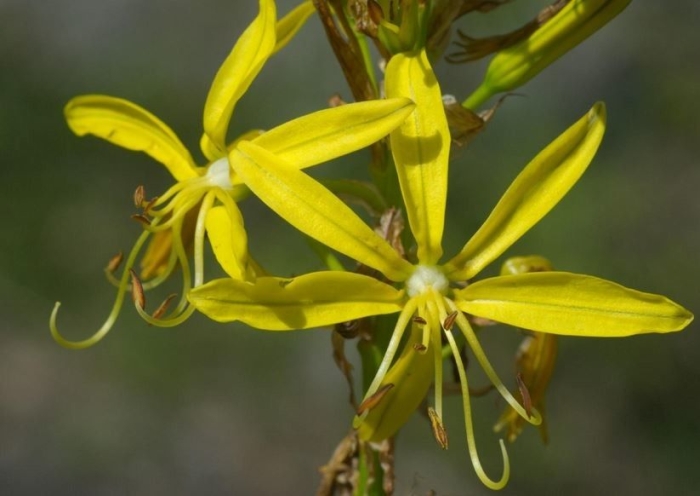King’s Spear
(Asphodeline lutea)
King’s Spear (Asphodeline lutea)
/
/

Guillaume Labeyrie
CC BY-SA 4.0
Image By:
Guillaume Labeyrie
Recorded By:
Copyright:
CC BY-SA 4.0
Copyright Notice:
Photo by: Guillaume Labeyrie | License Type: CC BY-SA 4.0 | License URL: https://creativecommons.org/licenses/by-sa/4.0/ | Attribution: Guillaume Labeyrie (cc-by-sa) | Rights Holder: Guillaume Labeyrie | Publisher: PlantNet | Date Created: 2020-04-07T18:09:01Z | Title: Asphodeline lutea (L.) Rchb.: flower | Notes: |
















































Estimated Native Range
Summary
Asphodeline lutea, commonly known as King’s Spear, is an evergreen perennial herb native to the Mediterranean region, particularly thriving in open, rocky places, and scrublands. It typically grows to a height of 3 to 4 feet (0.91 to 1.22 meters) and is noted for its striking vertical form. The plant produces a dense raceme of bright yellow, star-shaped flowers, each about 1 inch (2.5 cm) across, which bloom in late spring to early summer. The flowers are highly showy and can add a burst of color to any garden setting. The foliage consists of long, linear leaves that remain green throughout the year.
King’s Spear is valued for its ornamental flowers and architectural form, making it a popular choice for sunny borders, rock gardens, and Mediterranean-style landscapes. It is drought-tolerant once established, making it suitable for xeriscaping. While it prefers well-drained soils, it is adaptable to various soil types, provided they are not waterlogged. It is generally low-maintenance, but it can be susceptible to root rot in poorly drained conditions. There are no widely recognized cultivars of this species in the horticultural trade, but its natural form is quite appealing.CC BY-SA 4.0
King’s Spear is valued for its ornamental flowers and architectural form, making it a popular choice for sunny borders, rock gardens, and Mediterranean-style landscapes. It is drought-tolerant once established, making it suitable for xeriscaping. While it prefers well-drained soils, it is adaptable to various soil types, provided they are not waterlogged. It is generally low-maintenance, but it can be susceptible to root rot in poorly drained conditions. There are no widely recognized cultivars of this species in the horticultural trade, but its natural form is quite appealing.CC BY-SA 4.0
Plant Description
- Plant Type: Herb
- Height: 3-4 feet
- Width: 1-2 feet
- Growth Rate: Moderate
- Flower Color: Yellow
- Flowering Season: Spring, Summer
- Leaf Retention: Evergreen
Growth Requirements
- Sun: Full Sun
- Water: Medium
- Drainage: Slow, Medium, Fast
Common Uses
Bank Stabilization, Bird Garden, Border Plant, Edible*Disclaimer: Easyscape's listed plant edibility is for informational use. Always verify the safety and proper identification of any plant before consumption., Fragrant, Hummingbird Garden, Low Maintenance, Rock Garden, Showy Flowers, Street Planting
Natural Habitat
Native to open, rocky places, and scrublands in the Mediterranean region
Other Names
Common Names: King’s-Spear, Yellow Asphodel, Jacob’s-Rod, Junkerlilja
Scientific Names: , Asphodeline lutea, Asphodelus luteus, Asphodelus sibiricus, Dorydium luteum, Dorydium luteum publ,
GBIF Accepted Name: Asphodeline lutea (L.) Rchb.